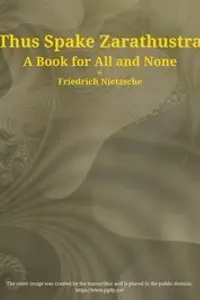Summary
Thus Spake Zarathustra (1883–1891) is Friedrich Nietzsche’s magnum opus, blending philosophy, poetry, and prophetic prose into a bold and visionary work. Presented as the teachings of a fictionalized prophet named Zarathustra (inspired by the ancient Persian figure Zoroaster), the book follows his spiritual journey as he descends from solitude in the mountains to preach a radically new vision of humanity.
Through parables and aphoristic proclamations, Zarathustra introduces concepts that would become central to Nietzsche’s philosophy: the Übermensch (Overman or Superman), the will to power, and the eternal recurrence.
He rejects traditional morality, religion, and herd mentality in favor of self-overcoming, creative power, and living authentically.
Zarathustra’s words are poetic, cryptic, and revolutionary—at times ecstatic, at times tragic—as he confronts misunderstanding, solitude, and the burden of enlightenment.
